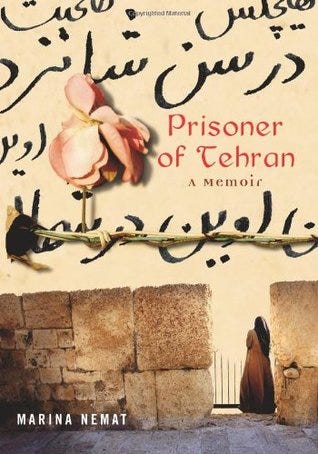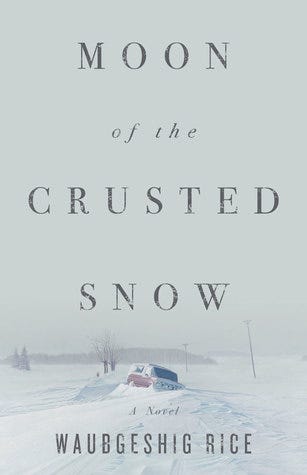Book Reviews
Reviews of books by Marina Nehmat, Waub Rice, Patrick deWitt, and Carmen Maria Machado
Prisoner of Tehran
by Marina Nemat
2007
The Goodreads description of this book is basic: an “astonishing account of one woman’s remarkable courage in the face of terror and her quest for freedom.”
Exactly.
I read this book in 2019 prior to attending a memoir writing class at the University of Toronto led by the author. (The class was great; the author knowledgeable, sensible, empathetic.) The book broke my heart and made me reflect on how much pain people carry around with them and how little we know about the people around us, serving us, for example, at Swiss Chalet.
Because that is where the author found herself, years after her release from an Iranian prison, where she was locked up as a teenager, raped, tortured, and married off to one of the minions of the regime. That she was let out, married again, and left the country is perhaps miraculous. The comes the attempts to survive—carry on, push through the legacy of trauma.
Her new husband is a good man. He doesn’t ask what happened to her. He thinks she doesn’t want to talk about it. She thinks he doesn’t want to hear about it. She reaches a point where it must come out, and she begins to write her story. She gives it to her husband to read, expecting him to be angry, and he is heartbroken, apologizing to her that this has been her burden alone.
Trauma keeps pulling you back to the past, back to the inciting incidents. Part of the author is always a prisoner of Tehran. The book is a legacy for all survivors.
Moon of the Crusted Snow
by Waubgeshig Rice
2018
How you approach this story might depend upon where you are. If you live in a northern community, especially a “fly in” community (one connected to the outside world by air, possibly by ice roads in the winter), then you can imagine yourself at the centre of the action.
The power grid shuts off. Connection to mainstream southern society ends, except for small trickles of information, which are horribly bad. It’s possible the world as we know it has ended and all that’s left are those whose lives were once described as “remote.”
If you aren’t one of these remote people, then you probably didn’t survive the apocalypse. In which case, the realistic framing of the story, its presumptions and consequences, should simply terrify you—but, hey, enjoy the ride.
Because the ride is impressive. “A small Anishinaabe community goes dark,” the book flap says. A scramble for survival follows. Individuals and family networks are tested. Heroes and villains emerge. The author allows the story to unfold naturally, revealing details in a straightforward style.
Bravo. Stories like this, far from being remote, are central to our time. Sure, the book is entertaining, but it’s also provocative. As the risks of social and environmental collapse increase, what are we doing about it? We can’t all, when the time comes, disappear into the bush.
The Sisters Brothers
by Patrick deWitt
2011
Well, okay, it was fun. A rollicking homicidal adventure through the old west, a bit of a Blood Meridian lite, more humour, happier ending. Told in the voice of one of the protagonists, Eli Sisters, the story unfolds in controlled, clipped English familiar to the homespun mumbling of old movie Westerns.
In 1851, two assassins mount their horses and head across the continent to California to knock off their latest “job.” Complications and hijinks ensue.
But was the meal nutritious? Let’s not extend this metaphor too far, but my gut still rumbles. Is there enough of a genre update to make this take new? No. John Vernon’s 2011 review of the book in the NY Times said it was “not always serious, not always funny, sometimes derivative of old westerns, sometimes a parody of them.”
In short, he found the book uneven. Me, too. It was pleasant enough, but does it crack a new code? Is it responsive to our time? The Sisters brothers (the characters) trace familiar codes of masculinity, though there is space between the two of them. There is some reflection here on the options men have and the origins of those options. There’s some fiber in this diet. Enough? Keep eating dem beans, dudes (gratuitous “Blazing Saddles” reference).
In the Dream House
by Carmen Maria Machado
2019
I read this on my Kindle and highlighted one passage: "But the nature of archival silence is that certain people’s narratives and their nuances are swallowed by history."
On the surface, this book is a memoir of an abusive relationship. At its core, though, it is an interrogation of the stories that govern lives, how they are recorded, remembered, controlled, and define the opportunities of the protagonists.
The Dream House of the title is a literal house, but it is also a "dream house," a construction of the imagination. A house of dreams, hopes, aspirations, ideals, shadows, and ultimately nightmares.
The story of the central relationship, the coming together, the falling apart of two women, is told in short chapters, headlined with different genre descriptions. The Dream House as X. The Dream House as Y. The foregrounding of subjectivity is obvious; however, throughout the book the author interlaces references to statistical and historical figures and facts. Much research occurred in the writing of this book. We're reminded that not only did real events happen, they happened within a real historical context. But what did they mean? Here the author puts forward a persuasive case. Women can abuse women, no matter what lesbian idealism says.
Which brings us back to the highlighted passage above. One point the author returns to, is that she was a victim of domestic violence at the hand of another woman, yet for the longest time she had no language to express this victimization. It just didn't happen that way! They were two women in love! But it did happen, and the historical silence about the potential for women to be abusers is excavated from the archival record. The author focuses readers' attention with a bright light. Know it can happen. Be prepared and aware.
I knew about the genre/chapter framing going in, but it didn't turn out to be what I expected. I thought it would be more a recounting of the same events, once through a romance filter, once through a horror filter, once through a tragedy filter. But it was more like, all genres were happening at the same time. I'm not sure it was an effective device, but it was okay. The prose sparkles with intelligence and charisma. Good stuff.
Addendum: Afterwards I remembered I meant to make a comment about David Foster Wallace and Mary Karr. Machado notes how the story, the abuse DFW inflicted, was shared with the world in 2012 in Every Love Story is a Ghost Story, but it did not make waves until #metoo shook the broader pond. I want to say thank you to Machado for this. I’m not a big DFW fan. I often don’t know what to do with him or how to access his work. Every once in a while I have tried. I’m done trying now.






My favorite work of Machado’s is her short story collection: Her Body and Other Parties.